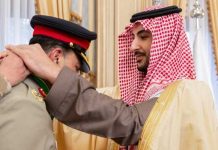ISLAMABAD: Some two months after the election of Shahbaz Sharif as chairman of the Public Accounts Committee (PAC), the Pakistan Tehreek-i-Insaf-led government called for his resignation.
The ruling party reached the conclusion at a meeting chaired by Prime Minister Imran Khan that leader of the opposition in the National Assembly should resign from the position of PAC chairman.
The meeting, that was attended by senior PTI leaders, also described the arrest of PTI leader and Punjab minister Abdul Aleem Khan as the National Accountability Bureau’s (NAB) “balancing act” that was aimed at justifying its actions against opposition leaders.
The PTI leaders also asserted that the government would not make any National Reconciliation Ordinance-like deal with any opposition leader.
Information Minister Fawad Chaudhry informed the media about details of the meeting in a video message. He said the government believed that Mr Sharif was using PAC as a shield against corruption cases initiated against him.
“The meeting expressed concern over the role and actions of Shahbaz Sharif as PAC chairman,” he added. “Shahbaz Sharif should step down and face corruption cases against him.”
He said PTI leader and Punjab minister Aleem Khan had resigned from his office after he was arrested by NAB in a corruption case.

Mr Sharif, who is president of the Pakistan Muslim League-Nawaz, was elected unopposed as PAC chairman on Dec 22 last year after months of wrangling between the PTI and the opposition parties.
PAC is the apex parliamentary watchdog that oversees the audit of revenues and expenditures of the government and is considered to be the parliament’s most powerful and important committee.
Previously, the PAC used to comprise only the members of National Assembly, but in recent past the members of Senate have also been made part of it.
Though there is no stipulation in the rules to give the chairmanship of the PAC to opposition parties only, there’s a tradition that the office is given to an opposition member to ensure transparency in financial matters.
Initially, the PTI-led government was reluctant to give chairmanship of this vital committee to the opposition leader, contrary to the tradition. However, Foreign Minister Shah Mehmood Qureshi later announced that Prime Minister Imran Khan had decided not to stand in Mr Sharif’s way if he wanted to head the PAC.
The information minister said Aleem Khan had set a good example by leaving his office after being arrested by NAB. “Shahbaz Sharif should follow Aleem Khan and step down too.”
The minister said Prime Minister Khan was “unhappy” over the arrest of Aleem Khan and vowed to introduce reforms in NAB.
Mr Chaudhry said Mr Sharif was not only using PAC as a shield against his cases, but efforts were now being made to make another PML-N leader implicated in a NAB case, Khawaja Saad Rafique, a member of the PAC. “The way Mr Sharif summoned NAB officials in the PAC meetings shows he wants to take shelter behind the PAC position,” he added.
The information minister said Aleem Khan’s resignation had highlighted the difference between the PTI and other parties.
Without mentioning the names of opposition leaders who were asking for a NRO-like deal, he said: “No deal and dheel [concession] will be given to anyone.”
Mr Chaudhry said the government had decided to bring all cases of corruption to their logical conclusion.
In a separate meeting with leaders of the Balochistan Awami Party (BAP), Prime Minister Khan vowed to resolve the problems confronting the people of the country’s largest province.
BAP’s delegation led by federal Minister for Defence Production Zubaida Jalal apprised the prime minister of the problems faced by the people of Balochistan.
The prime minister told the delegation he was aware of the problem of water scarcity in the province and said he was in contact with Balochistan Chief Minister Jam Kamal Khan Alyani to address the issue.
The prime minister expressed the hope that development projects, including the Gwadar port, would bring prosperity to the province.



